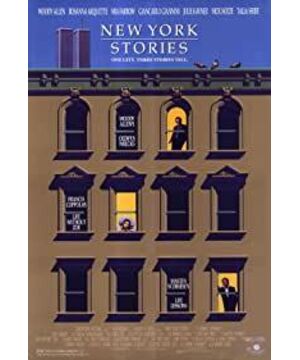Movies are similar to "New York I Love You", "Berlin I Love You", and "Paris I Love You". This collection of clips is a story directed by three different directors, all taking place in New York.
The first story, Life Class, tells the story of an older, successful artist caught in the habit of tension before an art exhibition. Under the traction of the specially designed lens language, the audience may be forced to participate in an older man's rape of women's youth. The offensive lens, the sword is drawn, the female audience may have a deeper understanding, the familiar, by men Discomfort of staring. As a successful artist, the artist gave a seemingly noble life and art education to a young girl who had nothing but youth and beauty. Offenses, and in these offenses, the artist shamelessly obtained the creative passion and inspiration, and finally completed the paintings required for the exhibition. And the girl couldn't bear his harassment and finally left him, and he also gained a new assistant at the end of the story, and the story began to repeat. It seems to be discussing the anxiety of artists' creation, but is it not showing the model of successful artists nourished by depriving the weak women around them of their youth and life? In the classroom of life, where the teacher wants to teach you to be a man, he clearly wants to teach you to be a man. The irony begins when the girl offers the artist to kiss the police as a test, and at the end the artist's clichéd language climaxes.
The second story does not have Zoe's life, and lets a group of children show the life of an upper-class (probably upper-class, if not I don't know) adult in New York City. There's something indescribably weird. I feel that the actors are serious about acting out stories that are not true, but because of their seriousness, this seriousness is dazzling. A child comes to teach his mother how to live, and the inversion of identity also makes the story more erratic and untrustworthy. , which makes people even more suspicious that the scene depicted in the whole story is a kind of irony. Obviously everyone is performing seriously, but it presents the effect of a fun mirror.
The troubles of the third story Oedipus, it was after reading this passage that I felt full of malice. Or Woody Allen's old-fashioned routine, an intellectual who is dissatisfied with life (he can always make the women he meets fall in love with him, which is a very unpleasant point for me, especially when Woody Allen plays himself, too unbelievable La, a personal prejudice), mired in relationships with women, and of course someone plays the piano in it. A middle-aged man who is about to marry a girlfriend he has known for half a year has a tense relationship with his mother, who disappears in a magic trick. After searching unsuccessfully, the middle-aged man found that he seemed to have an easier life, and he was more harmonious and masculine with the woman he was about to marry. So I decided to give up searching for my mother. However, the dramatic thing was that my mother appeared in the sky of New York and told the citizens about the man's private affairs and condemned the man for not marrying his girlfriend. The male protagonist fell into anxiety again. Helpless in every possible way, he turned to the wizard, but he developed a friendship with the wizard, and was trapped by the existence of his girlfriend, so he had to leave. Later, the girlfriend said goodbye at the right time. The man was able to stay with the wizard, and then the mother came back. Life seems to be on track, or is the struggle ineffective? The man left his mother, and through his love for another woman, the mother's influence on the man was so great that after disappearing, he would mobilize the power of the whole city to affect his normal life (a man still cannot live without a mother), and the mother As well as being part of the man, the man's dialogue with the wizard is much like a replica of his mother's relationship with him. Then the wizard and the mother reached an identity overlap with the matter of cooking muscles. It can be said that the imprint of a mother on a man is fatally inescapable. This story tells of an existential futility. Full of malice.
Maybe it's because I don't understand too much, I just feel that these jokes make me sad.
View more about New York Stories reviews











